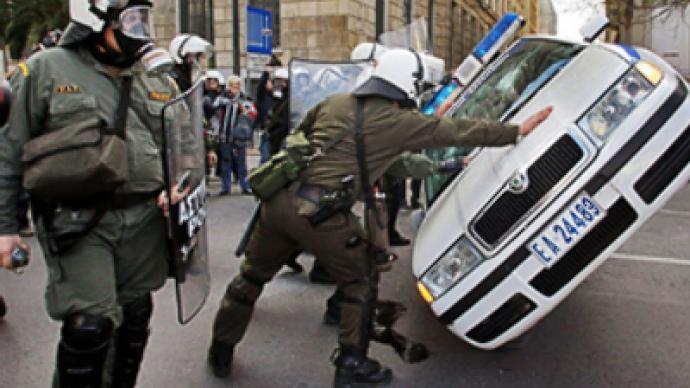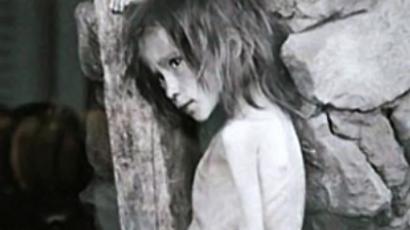Anarchy in Europe: it could only take a spark

Police and demonstrators continued to battle on the streets of Athens despite revelations that the death of 15-year-old Alexandros Grigoropoulos earlier was caused by a deflected bullet rather than a direct shot.
The police ballistics report on the bullet that killed Grigoropoulos indicates that it had hit something else before hitting the boy in the chest. The violence has held the country in a vice-grip of fear for the past three weeks. Gangs of youths, throwing stones and Molotov cocktails, have engaged with the police and wrecked businesses as they vented their anger and frustration.
Within 24 hours, from Moscow to Madrid, sympathetic groups of people showed solidarity with the Greeks by protesting and rioting in their own towns and cities.
London, Paris, Rome, Berlin, Frankfurt, Madrid, Barcelona, Copenhagen, Bordeaux, Seville and Dublin all saw varying degrees of protest. With the gloom of the global economic outlook, the fear is that more civil unrest and violence could occur across Europe in the months to come.
All it could take is another spark, like the death of Alexandros, to mobilise people once more onto the streets. But who are these groups and just how well organised is the upheaval and unrest? More importantly, as 2008 comes to a close, how likely are repeat performances in 2009?
Georges Prevelakis is a Greek-born professor of Geopolitics at the Sorbonne University in Paris, the starting point for the infamous Paris riots of 1968. Speaking from Athens, he described the present situation: “There is still a little trouble, it is not as intense as last weekend; it is sporadic; there are demonstrations but from young kids, from schools rather than universities. We have just got confirmation that the killing of Alexandros was an accident – he was killed by a ricochet bullet as opposed to a direct shot so that may be a factor.”
However, there is more to the unrest than the killing of the teenager. Prevelakis explains the background to the explosive reaction: “There are major problems in Greece at present; there is a lot of corruption and very little confidence in public services. The Greek society and state are sick and it has been difficult to reform. The main factor that caused the problem here was that the children of middle to upper class families are under extreme psychological stress. I call them the sacrificed generation – they realise they will not be able to compete, employment-wise, with Europe. They cannot even compete with the rate of consumption of their parents. They themselves have been consumed by the consumption society.”
This image of riotous schoolchildren, upset that they will not have the same opportunity as their wealthy parents, does not fit the ideal of the ‘average anarchist’ but obviously there is no photo-fit to begin with.
Prevelakis attempts to explain the meaning of an anarchist in Greece: “What we call anarchists is difficult to define; it’s difficult to understand whether there is a structure or coherent group behind it. It’s quiet opaque. They are mainly marginal and can be infiltrated and used by other people. Who? Some people say the police, some say those with private interests, others claim a criminal element, but it's impossible to know. There seems to have been an obvious effort to overthrow the government that has not succeeded. Had the government fallen into the trap of repressing the riots further that could have been different.”
It’s clear that the riots in Greece, although sparked by the fatal shooting, also have their roots in Greek-specific issues. However, that does not explain the speed and contagiousness of the unrest elsewhere in Europe.
Could this situation happen just as easily in Paris for example? Could the riots of 1968 be echoed in 2008 and beyond? “The French media have asked me many times will this happen here, it’s a big worry”, Prevelakis says. “The French government is afraid that there will be a replication of the violence; however, the situations are very different. In France it is the children of immigrants who are marginalised socially and spatially – in Greece the epicentre of violence was the centre of the city, the middle class.”
The situations could indeed be described as different. But despite the fact that the causes are not the same, the effects have the potential to be, Prevelakis warns: “On the other hand, we live in an era where image is extremely important and the images of the riots in Athens are spreading elsewhere. Despite the fact that it is not the same social context, the behaviour can still be duplicated and imitated.”
That idea of replication and duplication is what Dr. Jeff Ferrell calls ‘Xerocracy’ – the idea of “rule through photocopying ”. It is a form of anarchic organization, of DIY revolt, that enables a riot in Greece to be duplicated all across Europe in a matter of hours.
Professor of Sociology at Texas Christian University, visiting Professor of Criminology at Kent University and author of ‘Tearing Down the Streets: Adventures in Urban Anarchy,’ explains further: “It is like a disorganised revolt mixed with technology that youths are so au fait with. There is no puppet master but these are kids that clearly do have an anarchist philosophy. Many of them do have a well developed political sense of what they are doing but it’s not so much an attempt to seize power as it is to destroy power. It’s clearly a revolt against all sorts of inequalities and justice is just one of them,” Ferrell said.
While it’s clear the Greeks have been mobilised by the lack of justice for Alexandros Grigoropoulos, the fear remains that other inequalities will cause further violence elsewhere. Dr Ferrell agrees: “We are almost revisiting the old punk era, the idea that there is no future, we are seeing that this generation of kids are forced to bear the brunt of the fall of the house of cards that was the international economy. I think we will definitely see more protest on the streets when economies begin to contract and these equalities become more apparent. This is what we are facing.”
But who will be pulling the strings behind the protests? “It’s not any organisation making decisions on behalf of the groups and that makes it even more dangerous because authorities can’t make any potential deals with the central committee because there is none! Of course this also means that it’s difficult to develop that into a traditional political force for; by the same token, there is no leadership structure.”
The future appears to be one where further protest is inevitable – facilitated by a global economic downturn. A whole generation could find itself disgruntled by the lack of opportunity that the generation before them had. A globalised world puts them in competition with many more people for work but at the same time exposes them to new ideas and methods of displaying their dissatisfaction.
They are an invisible force with no direct organization. There is no way to negotiate with them. They could be school kids, university students, special interest groups or simply troublemakers, all under a banner that does not even exist. Their reasons could be different but their reaction is likely to be the same. Governments take note – you have been warned.
Ciaran Walsh for RT














